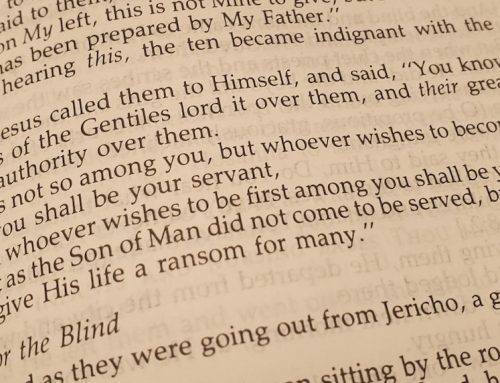It amazes me the lack of Bible understanding among church leaders who spout Bible verses profusely without even a basic grasp of the context of the verse or what the author was trying to communicate. There is always an appearance of deep spiritual insight and Biblical authority, but a closer look at the scriptures suggests they need to go back to the basics of the Word before attempting to teach others.
Jump to: Appearance of evil | New name | No other name | Study to show yourself approved | Unworthily | Use of concordances
1 Thessalonians 5:22 – Abstain from all appearance of evil.
This obsession with appearances has led to a church culture that thrives on optics: How one looks on Sunday morning; whether a man is allowed to be seen wearing shorts or blue jeans; whether anyone sees you buy alcohol, or if you order beer battered fish for dinner, making sure everyone knows there’s no alcohol in it; making sure one looks spiritual, even if takes gossiping about the latest so-called “fallen away Christian” to do it; making sure the church always comes off looking unified, even if everyone knows it’s a facade of forced unity, etc.
Could these practices fit any more perfectly the Pharisees that Jesus so often laid into? I contend that God is far more concerned with the heart, and not at all with all of these foolish attempts to look righteous via outward appearances. He doesn’t care a whit whether you ladies wear nylons on Sunday morning. Just saying.
Anyone ever heard the story of the disheveled college kid who showed up for church?
Isaiah 62:2 – And thou shalt be called by a new name, which the mouth of the Lord shall name.
Isaiah 62:4 – Thou shalt no more be termed Forsaken; neither shall thy land any more be termed Desolate: but thou shalt be called Hephzibah, and thy land Beulah…
Acts 4:12 – Neither is there salvation in any other: for there is none other name under heaven given among men, whereby we must be saved.
2 Timothy 2:15 – Study to shew thyself approved unto God, a workman that needeth not to be ashamed, rightly dividing the word of truth.
This one has been quoted countless time in Bible classes to exhort members to crack open their Bibles and study for class. It means no such thing. That’s not to say we shouldn’t come prepared for Bible studies with some actual knowledge of the subject material, but to use this verse in this way is grossly out of context. They didn’t even have a compiled Bible to study at this point, just occasional letters being passed around to churches. No printing press. No concordance. No Internet to do an exhaustive word search. Just some basic teachings about Jesus being passed around from church to church.
The misapplication actually comes from a rather simple misunderstanding of the archaic English word “study,” which means “be diligent,” not “crack open the Book.” What’s so fascinating about their KJV-only teaching is that you can get the correct understanding from the KJV if you educate yourself on English definitions and grammar. Ironically, they just choose not to “be diligent” in doing so.
Just for kicks, here’s the verse in the ASV:
2 Timothy 2:15 – Give diligence to present thyself approved unto God, a workman that needeth not to be ashamed, handling aright the word of truth. (ASV)
1 Corinthians 11:27 – Wherefore whosoever shall eat this bread, and drink this cup of the Lord, unworthily, shall be guilty of the body and blood of the Lord.
This verse is a frequently quoted out of context verse used incorrectly to suggest that members need to by “worthy” before taking the Lord’s supper. At risk of sounding like I think it’s okay to be sinful all the time, which I’m not at all saying, let’s at least deal honestly with the proper exegesis of this verse.
First, I’m not criticizing the use of KJV, because you can get the correct understanding of the verse right here in this version. Any understanding of English grammar tells you that a word ending in “ly” is an adverb, right? An adverb modifies the “manner” in which the verb is performed. Simply put, Paul is saying that whoever partakes of the Lord’s supper in an unworthy manner is guilty of the body and blood of the Lord.
So what’s the manner in which the Corinthian church was participating in the Lord’s supper? A quick reading of 1 Cor 11:17-34 tells us clearly that they had turned it into a common meal, a potluck of sorts where some had food and others didn’t. Some were even getting drunk on the fruit of the vine (yes, that means they were using wine).
They were not setting it apart in their minds as the Lord’s body (discerning the Lord’s body). When Paul said to examine yourselves, he nowhere said to examine all your sins for the past week. He was telling them to examine their conduct during the Lord’s supper and make sure they were giving proper honor in their minds to what it meant.
Here’s the verse in the ASV, but I recommend reading the entire passage in context.
1 Corinthians 11:27 – Wherefore whosoever shall eat the bread or drink the cup of the Lord in an unworthy manner, shall be guilty of the body and the blood of the Lord.
They were clearly “not discerning the Lord’s body” and acting quite unlovingly toward their brothers and sisters in the process. Think what you want about public confession on Sunday morning, but don’t use this verse to support it. It was never a practice in the first century.
And no one is ever “worthy” of standing before God. We are all worthy of death and deserve to be separated from God forever. It’s only because of his grace that we can stand before him spotless wearing the righteousness of Christ.
Note about the use of concordances
I’m convinced that the practice of removing verses from their context comes from the church’s over-dependence on concordances in “studying for class,” something everyone is taught to do without fail, for fear of getting rebuked. Don’t get me wrong…it’s great to come prepared for a Bible study being familiar with the material ahead of time. What’s not so great is making a list of verses you can share in class by consulting your Young’s Concordance, Thompson Chain Reference Bible, or Dixon Bible, without having read the entire context to know if the verses mean what you’re using them to mean.
Sure, you get to share your verses in class and thus don’t get rebuked for “not studying,” but then the whole church now has a wrong understanding of what that verse means. A little more diligence in personal Bible study is in order.
h/t to CB for catching my error on RSV 1911 vs. ASV 1901






I only wish I had access to this information when In was younger. Perhaps I could have convinced my parents to get out a whole lot earlier.
Spencer, I knew "study" was the old English for "endeavor," as I knew wine was not biblically forbidden. Revelation of these simple facts would not have deterred my devotion. There were much greater considerations… any presumption your finding of fault could have spurred an epiphany is presumptuous. Questioning church doctrine was a very delicate matter, with grave consequences, as the blogger has said. I love you, son. -Pops
Presumptions are presumptuous. That was from the department of redundancy department. Yes, I can still make fun of myself.
Regarding study, what about the noble Bereans?
Acts 17:11 These were more noble than those in Thessalonica, in that they received the word with all readiness of mind, and searched the scriptures daily, whether those things were so. (KJV)
I'm certainly not suggesting we avoid studying the Bible. I obviously don't believe that to be the case or I wouldn't be having this conversation about the scriptures. I'm simply pointing out the fact that the verse is pulled out of context and used for a purpose it was not intended to be used for, that's all. And so is this one. In Acts 17, Paul was on his second missionary journey, probably somewhere around 51 or 52 A.D. He had just passed through Thessalonica in verses 1-9 and established that church before entering Berea in verse 10. Since the… Read more »
I appreciate this blog Kevin. I also love how you used "Anonymous" provided scripture as further reiteration of how scriptures are being misused and out of context. I wish I had someone to teach me HOW to READ the Bible while growing up. In the CoC, we learned how to MEMORIZE scriptures. I've learned so much more while attending "an off church" as they refer to churches outside of the CoC. I learned more about the Bible and about God and His love in the few short years I attended. Whereas what I learned in the CoC was very minimal… Read more »
Excellent point Kevin. Now that modern day Christians have the entire Old and New Testament there is no excuse not to search the scriptures to see if WHETHER THOSE THINGS WERE SO (emphasis mine).
Dear readers, have you been searching the scriptures to see whether what you are being taught by your teachers and preachers is so? Are you following Christ Jesus and your God-given conscience or are you following a small group of decision makers and appointed judges? Are you working out your own salvation or is somebody taking on the task for you?
Good point Anonymous. They are following man's law's which leaves their salvation in the hands of man. That is a dangerous thing! They are not working out their salvation.
Spencer's dad…thanks for your honesty. I've found that to be the case as well. Sometimes it seems no amount of logic can reach the heart when there is such a deep emotional connection to the sect. I'm glad you eventually found your way out of it.
Notice that there has been no refutation of these out of context verses. Merie's exegesis of Isaiah 62:2 from the Church Lesson is completely out of left field regarding the name of the church. 1 Thessalonials 5:22 "appearance of evil" has been taught wrong in the church since day one, and has caused so many of the church's wrong judgments/opinions/doctrines. Yet the church claims to have special guidance from the Holy Spirit that no one else has. If that's the case, how could they get the meanings of these verses so wrong for so many years? How about this…let's agree… Read more »
Martinelli's sparkling cider is considered an appearance of evil because it looks too much like champagne.
This may be different in different congregations, or it may be a doctrine they've loosened up on, because I know that some members have served Martinelli's recently.
Members often served Martinelli's in defiance of senior teachers' rulings. This judgment came from the top.
non-alcoholic beer is also not allowed.
Another often used scripture 1 Peter 2:9 (KJV)
9 But ye are a chosen generation, a royal priesthood, an holy nation, a peculiar people; that ye should shew forth the praises of him who hath called you out of darkness into his marvellous light;
I think they often used we are "…a peculiar people" to justify many of their additional rules.
You are totally correct Anon 10:18PM. A specific part of 1 Peter 2:9 was used frequently “… a peculiar people" by teachers/preachers to justify their additional rules; rules you could not find in the bible. And their rules were allegedly backed up because they had the Holy Spirit and because "we have the truth" and no one else does. Using scriptures out of context was frequently used as a form of indoctrination into their man-made rules religion. Essentially they promoted themselves as infallible; something they accused the Pope of. You were to set aside anything you didn't understand because you… Read more »
Silence Dogood. You captured the issues, causes, results and solutions perfectly. Well said! Thank you for taking the time to post and I hope you continue to do so. It is very enlightening.
Kevin, I am troubling getting over the teaching on the following verse. It is one scripture they use for standing up for confession and asking for forgiveness. It can be used for any public sin or private sins between two brethens. It's used for a public sin that may have put a reproach on the church (such as going to a movie theater).
Matthew 5:24 | Read whole chapter | See verse in context Leave there thy gift before the altar, and go thy way; first be reconciled to thy brother, and then come and offer thy gift.
I decided to do a full post on this subject: Matthew 5 – Rules and Regulations For The Church
if not too much to ask can you please post an explanation on why staton coc members stand up and ask forgiveness from the church for bring a reproach on the church by commiting a publich sin it was my understanding that by bringing up a reproach on the church you have brought something against the brethren and therefore need to be reconciled. I wish a member of the Stanton coc would post their defense on these matters
1) Standing up is something they pull from the Old Testament, presumably Leviticus 9:1-5. This involved the whole congregation standing to go to the front of the tabernacle so Aaron could offer a sacrifice for the sins of the people. Merie made the tenuous connection that the tent of meeting was like Sunday church service, the sacrifice for sin is like the Lord's supper, and the standing up is God's requirement. Where God actually said any of that is, of course, nowhere to be found. 2) As far as bringing a "reproach on the church," this phrase also nowhere to… Read more »
They also use Nehemiah 9
i have read your thoughts on matt 5 and now i have a question, if a christian in his own conscious AND in his own heart feels as he/she has sinned against the church would it be in your opinion appropriate/okay to be reconciled with the brethen by standing up and asking for fogiveness from the church before giving into an offering of gift/worship? not because he is adding onto the bibical scriptures set forth by God or because a "teacher" has instructed to do, but doing so in the sake of adding on virtrue it being done out of… Read more »
Anon 11:58, if I understand your question right, then certainly it would be appropriate, in my opinion, for that person to follow their conscience. However, I just don't believe that's what the scriptures are teaching us. I believe that's a misunderstanding. But there is room in the kingdom for all of us who may have misunderstandings along the way–some that we grow out of with spiritual maturity, and perhaps some that we never straighten out. Note that "the church" is not a person–it is not a brother that we've wronged, and that we therefore need to reconcile with before "bringing… Read more »
thanks ! But I am still at question on this scripture. Shouldn't I be drawing out the principles on Matt 5? Isn't Christ showing us how not to be hyprocrites in areas of our lives? Isn't Christ telling me don't be worshipping as hyprocrites but do so until you have reconciled with the brother or reconciled within yourself within your hearts in areas of hyprocrispy before worshipping? whether or not that includes asking forgiveness from the church members? I don't mean to sound like I'm defending anybody but as for my understanding as to what your trying to teach .
Yes, we should look for the principle, but it's possible to misunderstand the principle, and thus infer an incorrect application. I believe the principle Jesus is teaching is "All the outward works of service to God don't make up for the lack of reconciliation with a brother you've wronged." I don't believe the principle was in any way intended to become a "rule" about things you need to do prior to worshiping God. Reasonable people can disagree, of course. I'm not going to set my opinion up as authoritative, but I think a fair reading of what Jesus was teaching… Read more »
Just shows me how it is more important to God that we right wrongs against people and be reconciled than it is to sacrifice. The fruit of that is forgiveness and love (love being the second greatest commandment). Matthew 22:36-40 (KJV) 36 Master, which is the great commandment in the law? 37 Jesus said unto him, Thou shalt love the Lord thy God with all thy heart, and with all thy soul, and with all thy mind. 38 This is the first and great commandment. 39 And the second is like unto it, Thou shalt love thy neighbour as thyself.… Read more »
My favorite bible is the Thompson 4th edition. I have two of them.
In my congregation I was the go to person if you needed a concordance. I was always finding them for fairly a cheap price and I would just give them away to members that needed them.
Tithe. Is using the term Tithe in a NT church proper? I attended a COC recently that has begun using the OT term? I was wondering if you have any thoughts on the term. I was of the mindset of being a cheerful giver and not under compulsion is the way to live. We cannot out give God and he does not need our money. I was taught its a heart issue. Tithing as I understood was about first fruits. Is it acceptable to put tithe, contribution or offering in the same category. I am thinking that financial pressures has… Read more »
Anon 2:52, I agree that many churches facing financial pressure go back to the idea of tithing for that reason. There is no NT obligation to tithe. However, I recommend a little book by Randy Alcorn called The Treasure Principle that is an awesome defense of making the voluntary decision to tithe to God the firstfruits. Most people would say this need to go to the local church. I don't agree. How about "tithing" (setting aside a tenth) and using it to directly help someone in need each month anonymously? There are a lot of creative things we can do… Read more »
Kevin, I would be interested in that book. My church uses the term "tithe" but they use it in a general sense of "giving". My preacher told me the same thing as you said., to give in the collection and, if you want, give directly to those in need or other local causes. When I used the term "collection", they didn't know what I was referring to.
Hey everyone! There is something I have wondered for a long time….even when I was still with Merie's group. It concerns the exclusive use of the KJV of the bible.When I first was baptized, I thought everyone was sincere about the KJV being perfect, and I still believe that the majority of the members really do believe that.The problem I had/have is that ones did point out areas of the KJV that weren't accurate, yet it was still touted as perfect. And when I tried to point out to ones that a certain exegesis couldn't be correct because of the… Read more »
They are still teaching that the KJV is the only "true" "real" translation…I was at a "non member" class recently and the teachers' whole point it seemed was to show that newer translations of the bible had words that didn't sound like words God would use…ironically one of the very words she was attacking she used to make a point about something else later in her class…traditions of men really rule the day in SCOC.
I must stand in the gap here as far as the superiority of the King James Bible in secular proofs and religious proofs. 1.) It is the only translation to be acknowledge as a masterpiece by secular and religious scholars. 2.) Only translation referred to as majestic by both secular and religious scholars. 3.) Heavenly changed the course of western civilization in literature, language, culture,thought and theology. 4.) The book called the Kings Secretaries states the King James translation is it's own literary form. In other words, it is it's own language. For four centuries it influenced all English speaking… Read more »
Totally agree Concerned.
Concerned, I'm sorry if I wasn't more clear as to what my concerns are. I, too, love the beauty of the KJV. To me, it's like poetry, and is my favorite version to quote!However, my two concerns are as follows;1. The Stanton group claims that the KJV is perfect, that it contains no errors.2. No other version is allowed to be read, or quoted.#1. The KJV is NOT perfect. It has errors. One example Kevin already spoke of, using Easter instead of Pentecost. The translators knew better, but inserted it anyway. Another example is the substituting of "candle" for lamp,… Read more »
Raise your hand if you think Jesus spoke English. In my opinion the only perfect version of the Bible would be the original manuscripts.
I agree, the KJV is a masterpiece but for the beginning Bible student and for children a more understandable version could be very useful. Is there an understanding or 'doctrine' that is mis-translated in other versions that people who believe in using only the KJV are concerned about? Are there translations in other languages that are considered comparable to the KJV in literary value? I am really curious.
Thank you Seeker and Debby, you articulated your points very well. 🙂
To Concerned and Martin Luther, who are the most vocally pro-KJV here, I have yet to find anyone here bashing the KJV as a horrible, unmajestic, or bad translation. You are arguing a different point than what "teach Jesus" and others like myself have said…that it is dogma ne must accept on faith for Stanton and others to teach that KJV is the *only* translation one can look at when attempting to understand the sense of a verse. I am not arguing about the accuracy of the words on the page, or the *ability* of someone to understand them, but… Read more »
Keven, Debbie asked for our evidence, thats all. I have no problem with other translations. I believe your parenting of us in this issue is uncalled for.
No intention to come across as parenting anyone. Just offering my take on the subject of KJV-only. Feel free to ignore. 🙂
Kevin's suggestion to do a Clean Bible challenge helped me tremendously ! I found that I HAD TO GET AWAY from the KJV to be able to really see the scripture without the influence of what I was brainwashed by the SCOC using the KJV. Once I started using NIV I realized it is just as true as the KJV, and I was able to leave the ghosts of man-made doctrine behind with the KJV. I also enjoy my Life Application study Bible, which is NIV.
Yes. I would acknowledge that NIV is not a perfect translation, and even that KJV is translated very well. But it is also undeniable that KJV is NOT infallibly translated, and that the archaic English does obscure the true meaning of many passages. Therefore there is no logic in confining oneself to KJV when we are making an honest attempt to understand the true sense of the scriptures.
In Eugene, my dad always preached from the KJV as the ONLY version acceptable to use and preach from. I'm just curious as to what the views were in SCoC to the 1611 KJV?
SCOC still believes in KJV only. I believe it's a good translation, but obviously the archaic language has obscured the meaning of some passages for some people.
When I became associate Pastor at One80 Ministries I used a Thompson NKJV, which is pretty standard for most "Southern Baptist" Pastors and teachers. I attended many huge church planting conferences in Riverside and the NKJV was used by 95% of those attending. Sometimes in my sermons, especially in Revelation, I would refer to several different versions, to try to help those younger in the church understand certain references I was talking about.
Reading the Bible is not considered study according to the teaching of the SCOC. If someone says "I read my Bible every day" the comeback would be…"but reading is not studying. You must study, not just read". JUST read – not good! If more people would read the Bible and not pick a word from a verse and get the definition of that word and go off on a tangent according to that word's definition maybe people would understand the full context of the Bible instead of isolated verses and words.